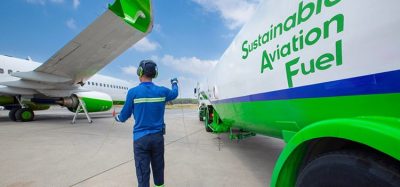Sustainable aviation and the importance of governance
- Like
- Digg
- Del
- Tumblr
- VKontakte
- Buffer
- Love This
- Odnoklassniki
- Meneame
- Blogger
- Amazon
- Yahoo Mail
- Gmail
- AOL
- Newsvine
- HackerNews
- Evernote
- MySpace
- Mail.ru
- Viadeo
- Line
- Comments
- Yummly
- SMS
- Viber
- Telegram
- Subscribe
- Skype
- Facebook Messenger
- Kakao
- LiveJournal
- Yammer
- Edgar
- Fintel
- Mix
- Instapaper
- Copy Link
Posted: 8 September 2021 | International Airport Review | No comments yet
If governments apply real governance, and aviation stakeholders are given strong financial incentives to meet emissions and CO2 reduction targets, an investment-friendly environment will be established.


To discuss sustainability in the aviation industry the conversation also needs to address the subject of governance according to Gediminas Ziemelis, the Chairman of the Board of Avia Solutions Group.
According to a sustainability report from the International Coalition for Sustainable Aviation (ICSA) aviation emissions amount to 2.1 per cent of the global share, however, when non-CO2 emissions are introduced into the equation, aviation contributes an estimated 4.9 per cent, to the overall global warming problem.
While the figures may seem daunting, the question needs to be asked; is the aviation sector being over-vilified at a time when governance regarding sustainability in the industry has never been so focused?
Major stakeholders in the aviation sector are being faced with the need to comply with the long-term decarbonisation goals being set by governments. But it seems that the governance of these goals is a moveable feast, with global governmental regulations still to be unified.
Even before the Paris Agreement on climate change came into force, aviation, a traditionally conservative industry, had already set in motion its own proactive governance to halve CO2 emissions by 2050. A figure which later matched the Paris Agreement’s goal to limit global temperature rises to below 2°C.
Additionally, in 2016, and working as a united body, the International Civil Aviation Organization (ICAO) decided to adopt a market-based global measure for aviation emissions, the Carbon Offset and Reduction Scheme for International Aviation (CORSIA). The scheme, it is envisaged, will allow the aviation sector to cut its CO2 emissions by 2.5 billion tonnes between 2005 and 2035. This target will be reached through $40 billion investment in carbon-reduction products backed by solid governance procedures.
The pre-emptive attention being paid to governance on sustainability right across the industry only serves to strengthen stakeholder and investor confidence in the future of aviation. Good governance also creates an environment equipped to identify, and profit from changes within the industry.
Already, investors are actively pursuing opportunities with businesses that promote sustainability in aviation backed by proper governance procedures. It has been established that the sustainable aviation fuel (SAF) market alone will be worth $15,307 million by 2030, a hugely significant increase from $66 million in 2020.
Since the onset of the COVID-19 pandemic, government support for airlines and the aviation industry has varied from country to country. In most countries, priority support and preferential treatment have been given to many ‘national carriers’ and larger airlines, which will most likely lead to these companies enjoying a bigger share of the market. However, if governments apply real governance, and aviation stakeholders are given strong financial incentives to meet emissions and CO2 reduction targets, an investment-friendly environment will be established.
Good governance will help ensure that sustainability-backed ‘green finance’, and accelerated efforts to reach the set targets will require vast capital investment. For investors, green finance offers the benefits of investment diversification and potential yield benefits arising from the governance driving sustainability.
Already, thanks to good governance, Etihad has secured a $111 million sustainability-linked loan to invest in biofuels, green buildings, waste management and other green issues.
The Royal Schiphol Group issued a €750 million green bond for investment in sustainable buildings across the airports it manages in the Netherlands. While Etihad also sold $600 million worth of Islamic bonds to finance the replacement of its old fleet along with investment in sustainable aviation fuel research.
In the case of the Etihad Islamic Bond deal, the coupon payments are dependent on the airline achieving a reduction in CO2 emissions of 17.8 per cent across its fleet, in comparison to 2017 levels.
Other examples of good governance in sustainability include the E7 billion support package for Air France by the French government, a deal reportedly conditional on the airline cutting its carbon emissions and making a reduction in domestic flights. Under the conditions of the bailout package, Air France is banned from competing with high-speed TGV trains across a selection of routes taking less than 2.5 hours. The deal would see Air France losing approximately 18 slots per day from Paris Orly Airport, while offering benefits to its competitors by allowing them to increase their operations and ensure the stability of airfares and increased customer choice.
Along with the constant striving to reduce emissions and improve fuel efficiency, other aviation sectors are also being influenced towards sustainability through good governance ‘cross-pollination’.
Improved ground operations, more sustainable infrastructure, and a wide range of other sustainability measures and incentives are being courted by an ever-growing number of investors.
The implementation of good governance procedures means that an organisation is well-placed to respond to an ever-changing environment. To fully understand the change that is happening throughout the aviation industry requires commitment, vision, leadership, and access to resources, all of which can only be born from adherence to good governance at every level of the industry.
Related topics
Aeronautical revenue, Aircraft, Emissions, Funding and finance, In-flight activity, Sustainability, Sustainable Aviation Fuel (SAF), Sustainable development
Related airports
Related airlines
Related organisations
Carbon Offset and Reduction Scheme for International Aviation (CORSIA), International Coalition for Sustainable Aviation (ICSA), The Royal Schiphol Group


















